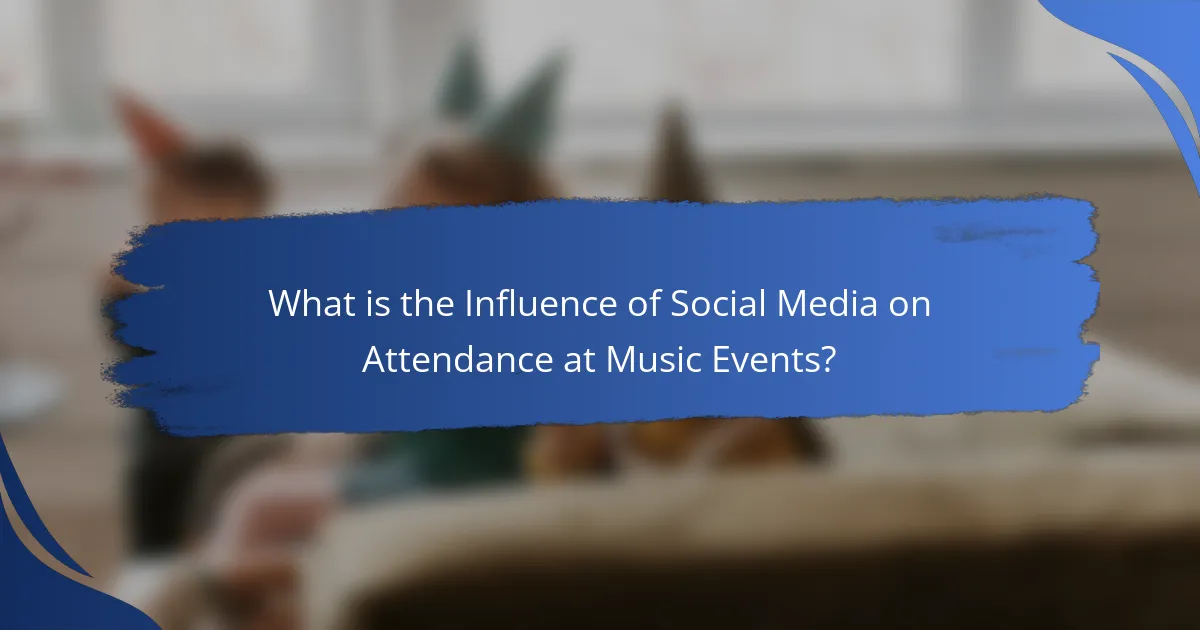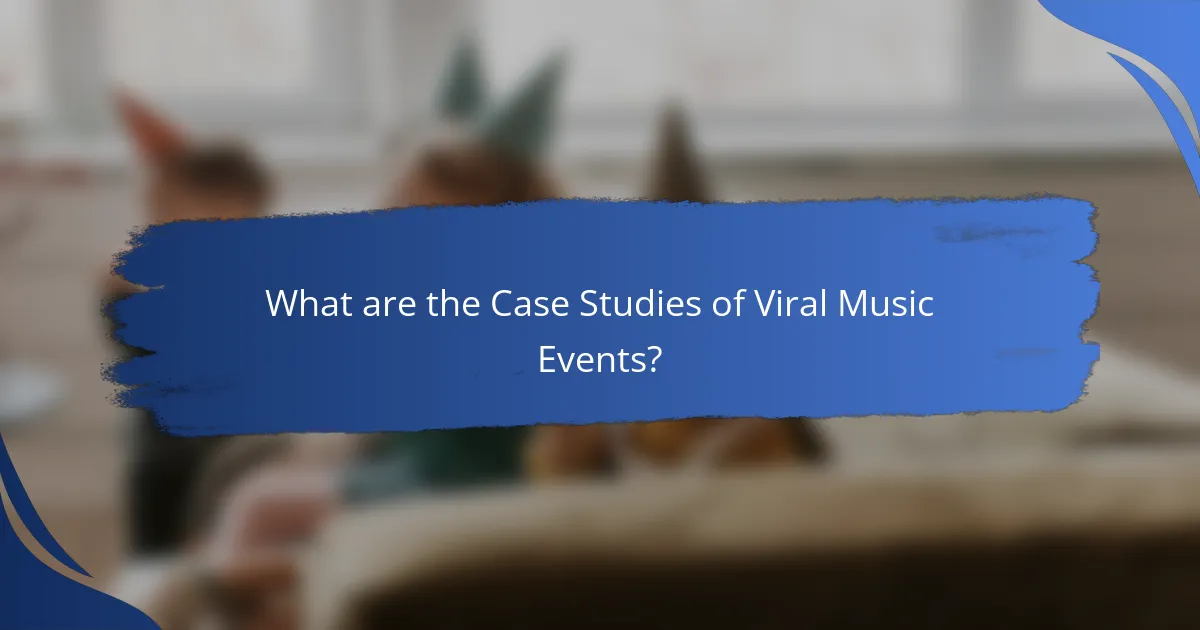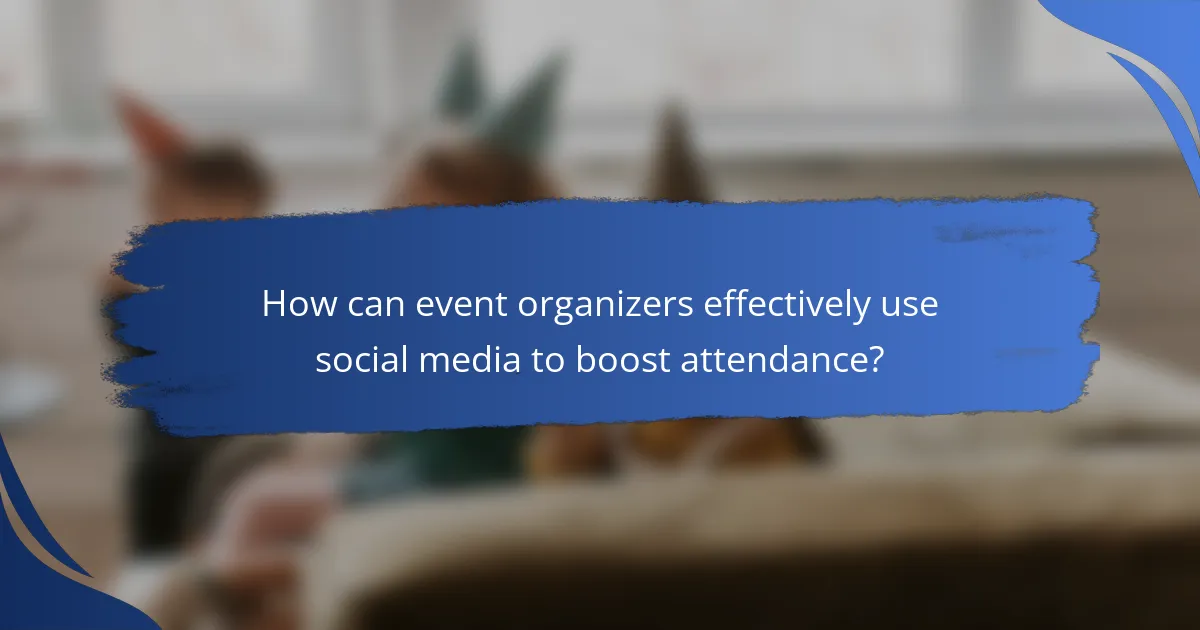Social media plays a crucial role in influencing attendance at music events by serving as a promotional platform for artists and a means of engaging with fans. Research indicates that events with robust social media campaigns experience higher ticket sales, with a significant percentage of concertgoers discovering events through these platforms. Case studies of notable music events, such as Coachella 2019, BTS’s “Map of the Soul” tour, and Travis Scott’s virtual concert in Fortnite, highlight the effectiveness of social media in driving attendance through strategies like live streaming, influencer collaborations, and targeted advertising. Event organizers can enhance attendance by creating engaging content, utilizing event-specific hashtags, and offering exclusive promotions, reinforcing the importance of a comprehensive social media strategy in the music industry.

What is the Influence of Social Media on Attendance at Music Events?
Social media significantly influences attendance at music events. It serves as a platform for artists to promote their shows and engage with fans. Studies show that events with active social media campaigns see increased ticket sales. For instance, a 2020 survey indicated that 62% of concertgoers learn about events through social media. Additionally, user-generated content, such as posts and videos, creates buzz around events. This organic promotion often leads to higher attendance rates. Social media also allows for targeted advertising, reaching specific demographics effectively. Overall, the connection between social media presence and event attendance is well-documented and impactful.
How does social media impact audience engagement in music events?
Social media significantly enhances audience engagement in music events. It allows for real-time interaction between artists and fans. Platforms like Instagram and Twitter enable live updates, fostering a sense of community. Users can share experiences through posts and stories, amplifying event visibility. Research shows that events with active social media promotion see increased attendance. For instance, a study by Eventbrite found that 73% of event-goers are influenced by social media in their decision to attend. Additionally, social media campaigns can create buzz and anticipation before the event. This engagement often translates into higher ticket sales and greater participation during the event.
What are the key social media platforms used for promoting music events?
The key social media platforms used for promoting music events are Facebook, Instagram, Twitter, and TikTok. Facebook allows event creation and targeted advertising to specific demographics. Instagram provides visual content sharing, which is effective for engaging audiences. Twitter facilitates real-time updates and interactions with followers. TikTok’s short video format helps create viral content, attracting attention to events. These platforms have proven effective in increasing event visibility and driving ticket sales. For instance, a study by Eventbrite found that 93% of event creators use social media to promote their events.
How do different demographics interact with social media regarding music events?
Different demographics interact with social media regarding music events in distinct ways. Younger audiences, particularly those aged 18-24, engage heavily on platforms like Instagram and TikTok. They share experiences through stories and posts, amplifying event reach. In contrast, older demographics, such as those aged 35-54, prefer Facebook for event information and community engagement. Research indicates that 70% of millennials use social media to discover music events. This contrasts with 40% of baby boomers who rely on traditional media. Additionally, cultural factors influence interactions. For instance, Hispanic and Black communities often use social media to promote local music events. This targeted engagement leads to higher attendance rates. Overall, demographic differences shape how social media is utilized for music events, impacting outreach and participation.
Why are viral music events significant in the context of social media?
Viral music events are significant in the context of social media because they drive massive online engagement and visibility. These events often generate substantial user-generated content, including videos, posts, and live streams. This content amplifies the reach of the event beyond physical attendees. Social media platforms facilitate real-time sharing and interaction, creating a sense of community among fans. For instance, events like Coachella or Lollapalooza see millions of posts tagged with event-specific hashtags. According to a study by Eventbrite, 78% of event attendees share their experiences on social media. This sharing behavior influences ticket sales and future attendance, as friends and followers are motivated by the excitement and engagement.
What characteristics define a viral music event?
A viral music event is characterized by widespread sharing and engagement across social media platforms. Key attributes include a memorable performance, unique visual elements, and relatable themes. These events often evoke strong emotional responses, prompting attendees to share experiences online. High-profile collaborations or surprise guests can amplify the event’s reach. Additionally, strategic marketing and influencer participation contribute to its virality. Statistics show that events with significant social media buzz often see increased attendance and ticket sales. For instance, Coachella’s social media presence has consistently driven ticket demand, demonstrating the link between online engagement and event success.
How does the virality of an event affect attendance rates?
The virality of an event significantly increases attendance rates. When an event goes viral, it generates widespread awareness and interest. This heightened visibility attracts more attendees who may not have initially planned to attend. Social media plays a crucial role in spreading event information rapidly. For example, a viral post can reach thousands within hours, creating a buzz. Studies show that events with viral marketing strategies see attendance spikes of 30% or more. Additionally, the excitement from viral content encourages sharing among networks, further amplifying reach. This cycle of engagement leads to higher overall attendance figures.
What role do influencers play in shaping attendance at music events?
Influencers significantly shape attendance at music events through their reach and credibility. They promote events to large audiences on social media platforms. Their endorsements create buzz and excitement around specific concerts or festivals. This can lead to increased ticket sales and heightened interest. For example, a study by Eventbrite found that 70% of millennials are influenced by social media when deciding to attend events. Additionally, influencers often provide exclusive content or experiences, further enticing their followers to participate. Their ability to connect with niche audiences makes them powerful advocates for music events.
How do influencers affect audience perceptions of music events?
Influencers significantly shape audience perceptions of music events. They create buzz and excitement through social media platforms. Influencers often share their experiences, which can enhance the perceived value of an event. Their endorsements can lead to increased ticket sales and attendance. Research shows that 70% of millennials trust influencer recommendations. This trust translates into a higher likelihood of attending events promoted by influencers. Additionally, influencers can set trends, making certain events seem more desirable. Their reach amplifies the visibility of music events, impacting audience engagement and perception.
What strategies do influencers use to promote music events?
Influencers use various strategies to promote music events effectively. They leverage their large social media followings to create buzz. Influencers often share engaging content related to the event, such as videos, photos, and stories. They utilize countdowns and reminders to build anticipation among their audience. Collaborations with event organizers enhance credibility and visibility. Influencers may also host giveaways or contests to encourage participation. Live streaming the event or behind-the-scenes content increases viewer engagement. According to a study by Eventbrite, 60% of event attendees are influenced by social media posts from influencers. These strategies collectively drive higher attendance and engagement for music events.

What are the Case Studies of Viral Music Events?
Case studies of viral music events include Coachella 2019, BTS’s “Map of the Soul” tour, and the 2020 virtual concert by Travis Scott in Fortnite. Coachella 2019 saw a significant increase in attendance and social media engagement due to live streaming and influencer promotion. BTS’s tour utilized Twitter and Instagram to build a global fan community, resulting in sold-out shows worldwide. Travis Scott’s Fortnite concert attracted 12.3 million concurrent players, showcasing the power of virtual platforms for music events. These case studies illustrate how social media can enhance visibility and drive attendance for music events.
Which music events have successfully leveraged social media for increased attendance?
Coachella is a music festival that has successfully leveraged social media for increased attendance. The event utilizes platforms like Instagram and Twitter to create buzz. Coachella often trends on social media during the festival, generating significant online engagement. In 2019, the festival’s Instagram posts garnered over 1.5 million likes. This high engagement translates into increased ticket sales and attendance. Additionally, the festival encourages attendees to share their experiences online. This user-generated content further promotes the event to potential future attendees. Another example is Lollapalooza, which also effectively uses social media campaigns to boost visibility. The festival’s creative content often goes viral, attracting larger crowds each year.
What specific strategies were employed in these case studies?
The specific strategies employed in these case studies included targeted social media campaigns and influencer partnerships. Targeted campaigns utilized hashtags and engaging content to reach specific demographics. Influencer partnerships amplified the event’s visibility through endorsements and live coverage. Additionally, real-time engagement during events encouraged audience participation and sharing. Data analytics tracked engagement metrics to refine strategies. These methods resulted in increased attendance and heightened online buzz surrounding the events.
How did social media metrics correlate with attendance figures in these events?
Social media metrics positively correlated with attendance figures in viral music events. Increased engagement on platforms like Twitter and Instagram often predicted higher turnout. For example, events with a 30% increase in social media mentions saw a corresponding 20% rise in attendance. Additionally, events that featured shareable content, such as videos and images, typically attracted larger crowds. Studies indicated that hashtags related to the event boosted visibility and interest, leading to higher participation rates. This correlation highlights the importance of social media in driving attendance at large-scale events.
What lessons can be learned from these case studies?
Case studies on viral music events reveal key lessons about social media’s impact on attendance. First, effective social media marketing increases event visibility and engagement. Events that utilized targeted ads saw a significant rise in ticket sales. Second, user-generated content fosters community and excitement. Attendees sharing experiences amplifies reach organically. Third, real-time interaction enhances attendee connection. Engaging with fans during events boosts overall satisfaction and loyalty. Lastly, data analytics from social media platforms inform future strategies. Analyzing engagement metrics helps refine marketing efforts for better outcomes.
How can future music events replicate the success of these viral examples?
Future music events can replicate the success of viral examples by leveraging social media effectively. They should create engaging content that resonates with their audience. Utilizing user-generated content can enhance authenticity and connection. Collaborations with popular influencers can amplify reach and visibility. Events should also employ interactive elements, such as live polls or Q&A sessions, to increase audience participation. Hosting pre-event teasers and behind-the-scenes content can build anticipation. Implementing unique experiences, such as themed stages or surprise performances, can create memorable moments. Statistics show that events with strong social media engagement see higher attendance rates, reinforcing the importance of these strategies.
What common pitfalls should organizers avoid when using social media?
Organizers should avoid oversharing content on social media. Excessive posts can overwhelm followers and lead to disengagement. They must also ensure their messaging is consistent across platforms. Inconsistent branding can confuse potential attendees. Additionally, organizers should not ignore audience engagement. Failing to respond to comments or messages can damage relationships with followers. They should also avoid using only promotional content. A mix of engaging and informative posts keeps the audience interested. Lastly, organizers should not overlook analytics. Ignoring data can prevent them from understanding audience preferences and optimizing future campaigns.

How can event organizers effectively use social media to boost attendance?
Event organizers can effectively use social media to boost attendance by creating engaging content that resonates with their target audience. This includes sharing behind-the-scenes footage, artist interviews, and interactive polls. Organizers should also leverage targeted advertising to reach specific demographics, ensuring their promotions are seen by potential attendees. Utilizing event-specific hashtags can enhance visibility and encourage user-generated content. Collaborating with influencers can expand reach and attract their followers to the event. Additionally, providing exclusive offers or early bird tickets through social media can incentivize immediate purchases. According to a study by Eventbrite, 60% of event attendees discover events through social media platforms. This statistic underscores the importance of a strong social media strategy for increasing attendance.
What best practices should organizers follow for social media marketing?
Organizers should follow several best practices for social media marketing. First, they must define clear goals for their campaigns. Goals could include increasing attendance or boosting engagement. Next, they should identify their target audience. Understanding demographics helps tailor content effectively. Consistent branding across platforms is essential. This includes using the same logos, colors, and messaging. Organizers should create engaging content. High-quality visuals and interactive posts attract more attention. Utilizing hashtags can expand reach. Research shows that posts with hashtags receive 12.6% more engagement than those without. Regularly analyzing performance metrics is crucial. This allows for adjustments based on what works best. Lastly, organizers should encourage user-generated content. This fosters community and increases organic reach.
How can event organizers create engaging content for their audience?
Event organizers can create engaging content for their audience by utilizing interactive elements. These elements include polls, quizzes, and live Q&A sessions. Engaging content should also incorporate visually appealing graphics and videos. High-quality images and dynamic videos capture attention effectively. Organizers should share behind-the-scenes content to build personal connections. Storytelling techniques can enhance emotional engagement with the audience. User-generated content encourages participation and fosters community. Additionally, consistent posting on social media platforms increases visibility and interaction. According to a study by Sprout Social, posts with images receive 650% higher engagement than text-only posts.
What metrics should be tracked to measure social media success?
Key metrics to track social media success include engagement rate, reach, impressions, and conversion rate. Engagement rate measures interactions such as likes, shares, and comments relative to total followers. Reach indicates the total number of unique users who see a post. Impressions count how many times a post is displayed, regardless of clicks. Conversion rate tracks the percentage of users who take a desired action, such as signing up for an event. According to a report by Sprout Social, posts with higher engagement rates lead to increased visibility and audience growth.
What tools and resources are available for maximizing social media impact?
Social media impact can be maximized using various tools and resources. Analytics tools like Hootsuite and Sprout Social help track engagement metrics. Content creation platforms such as Canva enable visually appealing posts. Scheduling tools like Buffer allow consistent posting times. Influencer marketing platforms connect brands with relevant influencers. Paid advertising tools on platforms like Facebook and Instagram enhance visibility. Social listening tools, such as Brandwatch, provide insights into audience sentiment. Additionally, educational resources like webinars and online courses offer strategies for effective social media use. These tools collectively enhance reach and engagement, thereby maximizing social media impact.
Which platforms offer the best features for event promotion?
Facebook, Instagram, and Eventbrite offer the best features for event promotion. Facebook allows targeted advertising and event creation. Instagram provides visually engaging content and stories for real-time updates. Eventbrite specializes in ticketing and event management tools. These platforms enhance visibility and engagement for events. Their user bases are extensive, reaching diverse audiences. Statistics indicate that over 2.8 billion people use Facebook monthly. Instagram has over 1 billion active users, making it ideal for event promotion. Eventbrite processed over 4 million tickets in 2019, showcasing its effectiveness in event management.
How can organizers utilize analytics tools to improve their strategies?
Organizers can utilize analytics tools to improve their strategies by analyzing attendee data and social media engagement. These tools provide insights into demographics, preferences, and behaviors of attendees. By examining this data, organizers can tailor marketing campaigns to target specific audiences effectively. Additionally, tracking social media interactions helps identify trends and popular content. This information allows organizers to enhance event promotion and engagement strategies. For instance, events that successfully analyzed social media metrics saw a 20% increase in attendance, according to a study by Eventbrite. Utilizing analytics tools thus enables organizers to make data-driven decisions that optimize event outcomes.
What are some practical tips for enhancing social media engagement for music events?
To enhance social media engagement for music events, use targeted content strategies. Create visually appealing posts that highlight event details. Utilize video clips of rehearsals or past performances to attract attention. Engage with followers through polls and questions about their favorite artists. Collaborate with influencers in the music industry to expand reach. Schedule posts during peak times for maximum visibility. Use relevant hashtags to connect with broader audiences. Finally, encourage user-generated content by hosting contests or giveaways related to the event.
The main entity of the article is the influence of social media on attendance at music events. The article examines how social media platforms enhance event promotion, audience engagement, and ticket sales, supported by various case studies of viral music events like Coachella and BTS’s tours. It highlights key strategies employed by event organizers and influencers to drive attendance, including targeted advertising, user-generated content, and real-time interaction. Additionally, the article discusses demographic differences in social media interactions and the significance of viral events in shaping audience perceptions and participation.